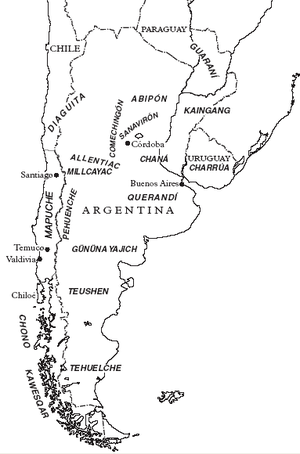Tehuelche language
Tehuelche (Aoniken, Inaquen, Gunua-Kena, Gununa-Kena) is one of the Chonan languages of Patagonia. Its speakers were nomadic hunters who occupied territory in present-day Chile, north of Tierra del Fuego and south of the Mapuche people. It is also known as Aonikenk or Aonekko 'a'ien.
| Tehuelche | |
|---|---|
| Patagón | |
| aonekko ʾaʾien | |
| Native to | Argentina |
| Region | Santa Cruz |
| Ethnicity | Tehuelche |
| Extinct | 2019 (with the death of Dora Manchado)[1] |
Chonan
| |
| Language codes | |
| ISO 639-3 | teh |
| Glottolog | tehu1242[2] |
 Map with approximate distributions of languages in Patagonia at the time of the Spanish conquest. Source: W. Adelaar (2004): The Andean Languages, Cambridge University Press. | |
The decline of the language started with the occupation of Patagonia by the Chilean and Argentinian states. Tehuelche were considerably influenced by other languages and cultures. This allowed the transference of morpho-syntactical elements into Tehuelche.[3] During the 19th and 20th centuries, Spanish became the dominant language as Argentina and Chile gained independence, and Spanish-speaking settlers took possession of Patagonia.
Although the language is not used on a daily basis, it is still a very important symbol for the group of people who identifies themselves as Tehuelche.[4][5]
In spite of the death of Dora Manchado in 2019, the language has been documented (from her), recuperated and revitalized by various groups of Aonikenks, with the collaboration of a group of linguists and anthropologists, that have made various studies and academic works about this language.[5]
Classification
Tehuelche belongs to the Chonan family together with Teushen, Selk'nam (Ona) and Haush. The latter two languages, spoken by tribes in northeast and far northeast Tierra del Fuego, has different statuses of documentation and linguistic revitalization by their corresponding communities.
Phonology
Morphology
Pronoun
| Singular | Dual | Plural | |
|---|---|---|---|
| 1 person | ia | okwa | oshwa |
| 2 person | ma: | mkma | mshma |
| 3 person | ta: | tkta | tshta |
Noun
Verb
References
- https://globalvoices.org/2019/11/06/museums-of-the-mind-why-we-should-preserve-endangered-languages/
- Hammarström, Harald; Forkel, Robert; Haspelmath, Martin, eds. (2017). "Tehuelche". Glottolog 3.0. Jena, Germany: Max Planck Institute for the Science of Human History.
- "Wayback Machine" (PDF). 2017-08-29. Archived from the original (PDF) on 2017-08-29. Retrieved 2020-03-18.
- "kketo sh m ´ekot - lengua tehuelche". kketo sh m ´ekot - lengua tehuelche (in Spanish). Retrieved 2020-03-18.
- "qadeshiakk". qadeshiakk (in Spanish). Retrieved 2020-03-18.
- Mason, John Alden (1950). "The languages of South America". In Steward, Julian (ed.). Handbook of South American Indians. 6. Washington, D.C., Government Printing Office: Smithsonian Institution, Bureau of American Ethnology Bulletin 143. pp. 157–317.
- Fernández Garay, Ana V. (1997): Testimonios de los últimos tehuelches. Buenos Aires: Universidad de Buenos Aires.(Spanish)
- Fernández Garay, Ana V. (1998): El tehuelche. Una lengua en vías de extinción. Valdivia: Universidad Austral de Chile [Anejos de Estudios Filológicos 15]. (Spanish)
- Fernández Garay, Ana V. (2004): Diccionario tehuelche-español / índice español-tehuelche. Leiden: University of Leiden [Indigenous Languages of Latin America 4].(Spanish)
- Viegas Barros, J. Pedro (2005): Voces en el viento. Raíces lingüísticas de la Patagonia. Buenos Aires: Mondragón.(Spanish)
- Ana Fernandez Garay, La nominalizacion de lenguas indigenas de la Patagonia, Puebla, México,2006 (Spanish)
External links
- Tehuelche (Intercontinental Dictionary Series)
- https://kketoshmekot.org (Tehuelche community website)
- https://qadeshiakk.wordpress.com (Materials about the language)